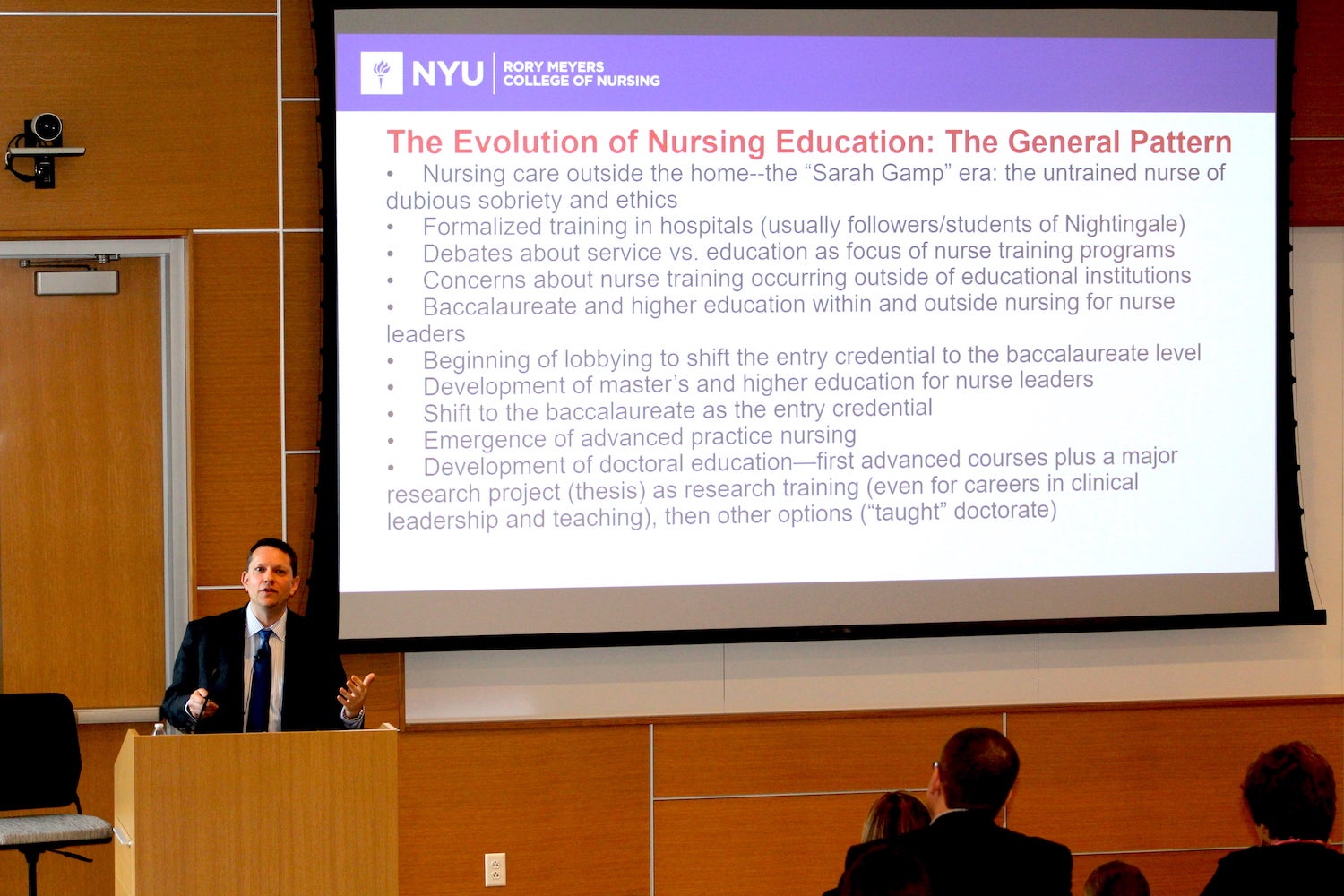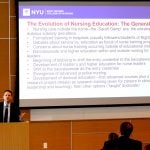Dr. Sean Clarke extols virtues of higher education for nurses during Spring Distinguished Lecture
Nurses are the front line of health care and are critical factors in the health outcome of any patient. Studies have shown that the quality of care patients receive is linked to the level of education nurses attain. In fact, for every 10 percent increase in nurses with bachelor’s degrees, there is a 7 percent drop in patient death, according to the National Institutes of Health.
That number could be even higher, as some studies have shown an increase in highly educated nurses can account for as much as an 11 percent drop in patient death. And it’s not just a decrease in mortality attributed to educated nurses. Studies have also shown a 10 percent increase in nurses with bachelor’s degrees accounts for an 8 percent improvement in overall patient outcomes.
Increasing education for professional nurses is a long-time goal of Dr. Sean Clarke, Executive Vice Dean and Professor of Nursing at New York University, who spoke before nursing students and faculty members at the Nursing Education Center in Providence Wednesday as part of the URI College of Nursing Spring Distinguished Lecture series. He’s been advocating for more nurses to attain bachelor’s degrees, beyond the associate’s degree nurses have traditionally attained, since he was part of a study involving more than 200,000 patients across 161 hospitals in 2003. That study determined that nurses with bachelor’s degrees account for the significant drop in patient death and improvement in health outcomes.
 Nurses who earn a bachelor’s degree tend to have more experience and interest in health research, a better understanding of health systems and concepts like population health, Clarke said in his presentation, “Ambitions, Patient Outcomes and Politics – The Past, Present and Future of Baccalaureate Nursing Education.” They also tend to have more rigorous science training, deeper overall knowledge of the health care system and a greater capacity for critical thinking.
Nurses who earn a bachelor’s degree tend to have more experience and interest in health research, a better understanding of health systems and concepts like population health, Clarke said in his presentation, “Ambitions, Patient Outcomes and Politics – The Past, Present and Future of Baccalaureate Nursing Education.” They also tend to have more rigorous science training, deeper overall knowledge of the health care system and a greater capacity for critical thinking.
“The greater breadth of knowledge can help improve assessments and patient interventions,” Clarke said. “Also, it’s thought an enhanced intellectual confidence can improve communication and interaction with peers in health care.”
The number of baccalaureate-trained nurses has been steadily increasing over the last two decades, more than doubling since 2001 to more than 163,000 new nurses each year earning their bachelor’s degrees. Since 2008, a majority (55 percent) of new nurses had earned their four-year degrees, and that number has steadily crept up each year. The American Nurses Association recommends that 80 percent of all nurses have bachelor’s degrees by 2020, and some states, including New York, have made it a requirement.
 The need for greater education among nurses will continue to increase as responsibilities for nurses increase in today’s health care environment, Clarke said. While nurses will continue to be the first line in direct patient care, they are also taking on more significant roles in the overall health care system. In the near future, they will be even more involved in case management, diagnosis, and operations of health systems like hospital management and insurance.
The need for greater education among nurses will continue to increase as responsibilities for nurses increase in today’s health care environment, Clarke said. While nurses will continue to be the first line in direct patient care, they are also taking on more significant roles in the overall health care system. In the near future, they will be even more involved in case management, diagnosis, and operations of health systems like hospital management and insurance.
“Nurses will be driving the car while helping to build it with other health care professionals,” Clarke said. “You need to have that broader education.”
Dr. Clarke is an internationally recognized nurse leader and health services researcher who studies quality and safety issues in acute care hospitals, workforce issues, occupational safety of nurses, and the influences of economic and political factors on healthcare delivery. He is known for research on nurse staffing in hospitals and the work environment. He has been a principal investigator on projects funded by the National Institute of Nursing Research, the Centers for Disease Control and Prevention, the Robert Wood Johnson Foundation, and the Ontario Ministry of Health and Long-Term Care.















